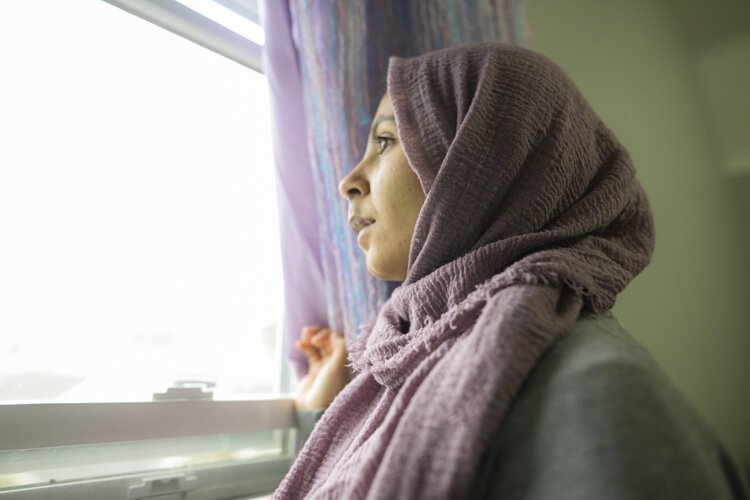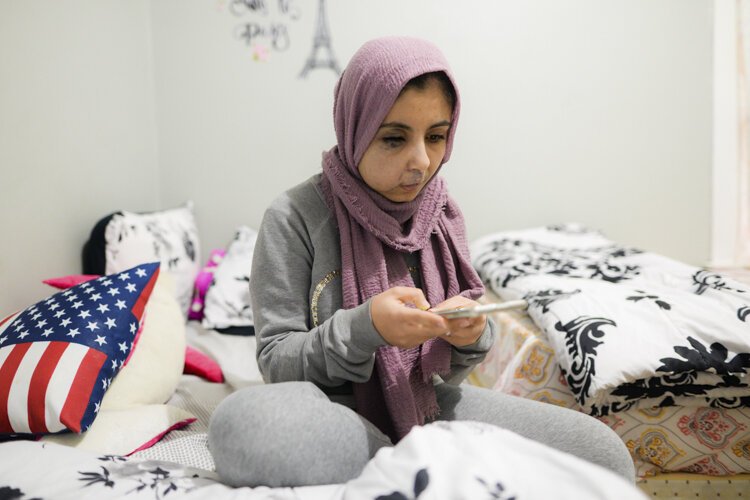Harnessing digital technology to support #CLE refugees in the face of coronavirus
Thomas Kate isn’t a medical professional, but he provides an equally important emergency service: translation assistance. A refugee from Burma and volunteer pastor at a church in Lakewood, Kate is often relied upon to help translate for other refugee community members in his congregation. This service has become more urgent in the face of the coronavirus, as Kate has rushed to inform his community about the public health crisis.
“Most of the adults in the 35 families in my congregation don’t watch the news and can’t understand English,” he says. “So every day, I translate updates [about the coronavirus] and post it to our community’s Facebook page. I text our members to remind them … that they need to stay inside, wash their hands, and not touch their face.”
Kate is one of many refugee leaders and service providers in Cleveland who are harnessing digital technology to keep their communities safe. In-person services at schools, churches, and refugee-serving organizations have temporarily closed their doors in the last week to ensure the safety of staff and clients. As a result, services for refugees increasingly occur in the digital space.
 Israa Alhashal plans to become an X-ray technician when she graduates from high school.For individuals like Kate, social media has been the primary outlet for connecting with their communities. Important public health updates, such as Gov. Mike DeWine’s March 22 order to “shelter in place,” are written and shared in English only. Similarly, the Ohio COVID-19 hot line is only available in Spanish and English, leaving out a large portion of non-English speakers. Kate and other refugee community leaders help to fill this gap by translating and transmitting updates through social media.
Israa Alhashal plans to become an X-ray technician when she graduates from high school.For individuals like Kate, social media has been the primary outlet for connecting with their communities. Important public health updates, such as Gov. Mike DeWine’s March 22 order to “shelter in place,” are written and shared in English only. Similarly, the Ohio COVID-19 hot line is only available in Spanish and English, leaving out a large portion of non-English speakers. Kate and other refugee community leaders help to fill this gap by translating and transmitting updates through social media.
Felix Tuunganwe, a Swahili instructional aide at Thomas Jefferson Newcomers Academy on Cleveland’s Near West Side, says social media has been a key medium for informing Congolese refugees in Cleveland as well.
“At first, many people thought [coronavirus] was a joke,” he says. “No one was prepared for this. So many people were asking what they could do to prevent the spread.”
“What we do through our group on Whatsapp [a messaging app] is we try to explain all new information in a local language, and change misconceptions people might have.”
And while the state government may expand access to resources like unemployment, the refugee community is often left out. Linguistic barriers not only prevent refugees from learning of these new resources but from applying for them on English-only websites. Leaders like Kate and Felix become the go-to translators for this new information.
It’s not only refugee leaders who have moved their services online, however. Local refugee resettlement agencies—organizations that partner with the U.S. government to support refugees once they arrive in the United States—and nonprofits are also turning to digital technology to keep in touch with clients.
Animation in 12 languages
One such local organization, Refugee Response, has partnered with Catholic Charities to create animated videos about the coronavirus. The two have utilized their translation expertise to create videos in 12 different languages.
“We are creating these videos to share the most important and credible information in a way that is easy to understand,” said Patrick Kearns, executive director of Refugee Response. “The videos can be viewed on a wide variety of devices and made available on any social media account or website.”
“We also understand that many of the clients we work with here and those across the U.S. and beyond might not be able to read in their home language. … The audio versions reduce barriers that might stand between someone getting credible information.”
Refugee Response chose languages based not only on Cleveland’s refugee community, but on the most widely spoken languages of refugees around the world. So far, the videos have been viewed more than 8,000 times by people in nine different countries.
Kate, who is a member of the Karen ethnic group—a persecuted minority in Burma—helped translate the informational video into his local language. Kate says Karen people in Burma, Thailand, and Australia have reached out to him, thanking him for the videos.
“The Refugee Response will be continuing production on coronavirus video content during this crisis,” said Noah Toumert, creative content producer at Refugee Response. “We are currently publishing videos on what to do after immediate exposure or symptoms and are planning a video on being alert to scams and misinformation related to COVID-19.”
Studying goes online
Finally, for refugee teens, digital technology has allowed them to continue to pursue their education in the absence of in-person classes. Israa Alhashal, a high school senior, says she relies on the internet to keep up with her English skills.
Originally from Syria, she and her family were resettled to Cleveland when she was 17. Israa immediately enrolled in Thomas Jefferson Newcomers’ Academy, a CMSD school which caters specifically to students who have recently arrived from other countries. There, she threw herself into classes in order to graduate by May 2020.
Before she can continue to college, however, Israa must pass an English proficiency test. In the absence of in-person courses, she’s turned to a mobile app—Duolingo—to sharpen her language skills, and reaches out to classmates on social media if she’s stuck on one of her homework assignments.
“Math is no problem,” she laughs. “The problem is practicing my English. I can’t ask my teachers questions when I’m at home. So if I have a problem, I message my classmates or use YouTube videos to help me learn.”
Upon graduating, Israa plans to become an X-ray technician and to help others who lack access to medical care.
“I’ve wanted to become an X-ray technician ever since I was in a [refugee] camp in Jordan,” she says. “There, people would have to wait two or three days to get help if they’d broken their hand.”
Asked whether she’s scared to go into the medical field with a pandemic looming, Israa just shrugs.
“I want to help people.”
Note: If you know of a non-English speaking community that would benefit from a coronavirus-related informational video and can help coordinate a translator, please email Refugee Response Creative Content Director Noah Toumert at noah@refugeeresponse.org.

